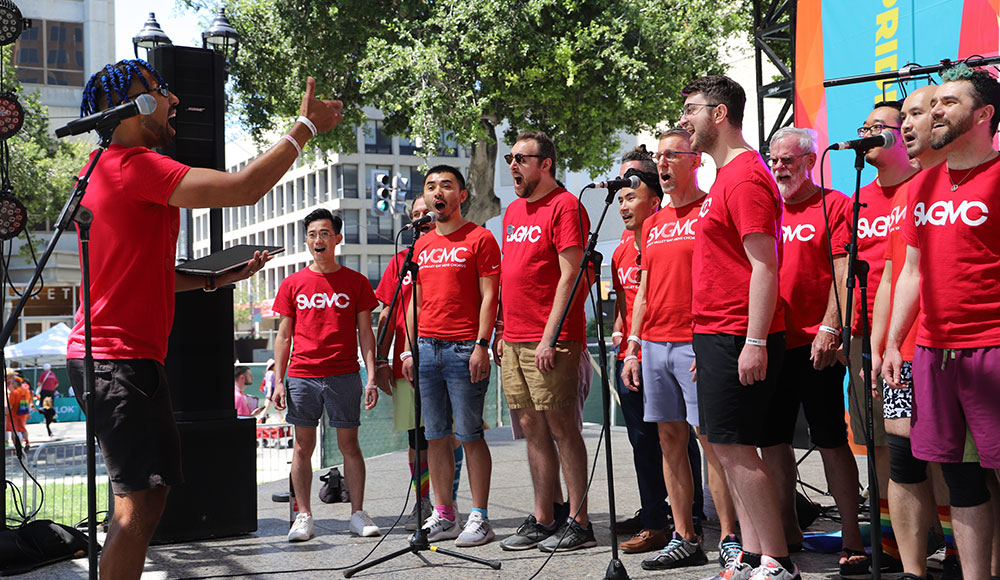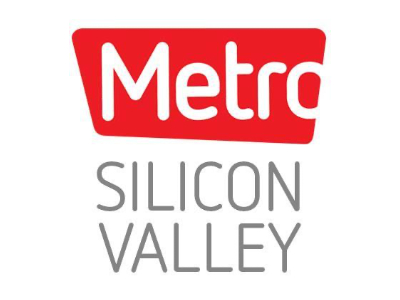Fifty years after its first march in San Jose, Silicon Valley Pride is still defined by the people daring to show up—who refuse to let the party, or the politics, fade into the background, and the community go unseen. People like Nicole Denson, CEO of SV Pride.
“I came out when I was 17 years old,” says Denson, who has “made it a point to attend San Francisco Pride and also San Jose, now Silicon Valley Pride, every year.”
The activist says attending year after year shaped her connection to the LGBTQ+ community. “I always felt it was important, even to this day. I no longer go to San Francisco on Sunday for the parade, but I remember starting with SV Pride in 2017 and that was a whole other level of the community bond that I have since developed and cherished.”
Denson had attended the first Women’s March in San Jose in 2016, after President Donald Trump won the presidency the first time. “It was right after the election had just happened, and I was in a desperate state to do something, to be heard,” she says. “There had to be some action because of the state that we were all in, as a country.”
After a recommendation from her brother Timothy, she connected with then SV Pride CEO Thaddeus Campbell, who had revived the event and was searching for a new board of directors for the nonprofit that was “coming back from a few depleted years when [Thaddeus] took over.”
The activists met at the Billy de Frank Center on a rainy evening, and he simply asked her what she’d like to help with. “He was like ‘What would you like to do? We have operations, marketing…’ And I thought, well, I work for the City of San Jose and I could help with permitting. ‘How about the chief operations officer role?’ And unbeknownst to me, it was one of the hardest roles in the organization,” she says, smiling. “It was the first year we brought the event back to Plaza de Cesar Chavez, which has been its home ever since.”

Over the years, SV Pride has shifted names, venues, and scope alongside the community it represents. The very first Pride event in San Jose was organized in 1975 by San Jose State University’s Gay Student Union across its campus, and a year later it moved to St. James Park as the Gay Freedom Rally and Dance. Among the roughly 300 attendees was Harvey Milk, who returned as a speaker in 1978.
By 1981, the celebration relocated to what’s now Plaza de César Chávez, then called City Plaza, and in 1983 took on the name Gay Pride Celebration. Just two years later it returned to St. James Park, where, according to QueerSiliconValley.org, about 5,000 people turned out—joined by a growing number of local LGBTQ+ businesses and organizations.
Throughout the ’80s and ’90s the event kept moving: from SJSU’s athletic fields on 10th and Alma, to the Santa Clara County Fairgrounds, to Stockton Avenue in the early ’90s, and in 1995 to Discovery Meadow, where attendance hit a then record high of 12,000 attendees.
Nearly two decades later, in 2014, Pride’s organizers rebranded San Jose Pride as Silicon Valley Pride to better include the region’s wider LGBTQ+ community.
After reviving the event with a new parade and venue, and clearing the debt that had burdened the organization in previous years, Thaddeus Campbell guided Pride’s return to its longtime home at Plaza de César Chávez.
In 2018, recognizing that Pride events often skew heavily male, the organization launched HEY GIRL!, a queer women–focused subcommittee under the SV Pride umbrella, co-founded by Denson and Liz Asborno.
“That first year I joined was a successful year. Since then, Silicon Valley Pride, under Thaddeus’ leadership and my own, cheering on his vision and mission, we’ve seen growth. The event has quadrupled in attendance, things are operating on budget, and we’re still growing and that’s in large part due to his vision.”
Chief Strategic Partnership Officer Saldy Suriben started with SV Pride in 2014 as chief marketing officer. “I had volunteered for other LGBTQ+ organizations such as GLADD and the Billy De Frank Center, but I felt like I wanted to give more back and enhance my skillset.”
With a background in event planning and a degree in marketing from San Jose State, Suriben says he was keen to get involved. “SV Pride, at that time, was the perfect organization to get involved with. Throughout the years, I’ve learned a lot, helping [Pride] with sponsorships and donations, so I was able to enhance my skillset after all, in addition to the marketing and planning,” he says. “Without being boastful, I do believe my contributions have helped make a difference in what SV Pride is today.”
On Aug. 21, Suriben was recognized for his advocacy work and commitment to supporting LGBTQ+ community organizations by Assemblymember Ash Kalra on behalf of the 25th Assembly District.
It’s thanks to contributions from individuals like Suriben and Denson that SV Pride has grown into a collaborative, well-attended celebration. Now, it not only provides guidance and support to the LGBTQ+ community but also advocates for their rights, sponsors year-round events, and awards $30,000 annually in scholarships to LGBTQ+ youth through the Thaddeus Orlando Campbell Scholarship Fund.
When Campbell passed away in 2019, Denson became interim CEO and then took over officially in 2021. Denson, reflecting on his influence and his work, says she still carries Campbell in her leadership today. “I always ask myself, what would Thaddeus do? When he took over the organization it was San Jose Pride. He had a vision to make a more high-tech festival and he also saw the need to diversify what SV Pride entailed—and not only in the landscape, which included all of the South Bay.”
Historically, Prides around the country have leaned toward white cis-gender gay males, Denson says. Under Thaddeus’ leadership, Pride brought on its first Chief Diversity Officer Sera Fernando, now Santa Clara County’s manager of the Office of LGBTQ Affairs.
“We became more intentional with our programming. We came up with a Trans and Friends rally that first year, and HEY GIRL!, a collaborative subcommittee of SV Pride,” Denson says. The organization produces and promotes events that are geared toward “queer women and femme identified individuals across the entire LGBTQ+ spectrum, including our gender-non-conforming siblings,” she says.
HEY GIRL! has grown over the years, and it always has a “large stake hold” at Pride. “The subcommittee was a largely part of Campbell’s vision,” Denson says, and the team continues to move his vision forward every year, welcoming new advocacy group partners and sponsors that align with the organization’s mission and vision.
“He was my friend, my mentor, and somebody that I look to make proud each year. We try to make a festival that he would enjoy and be proud to be a part of,” she adds.
Now at the 50-year mark, Denson reflects, carrying Pride’s legacy forward is something she sees as a necessity.
“With the state we’re in, much like in 2016, but worse, I think that we’ve been set back 50 years. The true meaning and need for Pride is alive now more than ever. Pride was not started to be a party in the streets. It started from a need to be seen, to be heard, to be visible, to have a right to live. Right now, our rights are being stripped away from our community, and all other marginalized communities in this country. The need for Pride, the true definition, and the root of what it’s for, is more important now than ever.”
Moving forward, Suriben hopes SV Pride remains as fabulous and exciting as it continues to grow. “We want people to be their authentic self,” he says. “We’re here for you, as a community, for whatever you need, to be out and proud.”
Denson says she wants this year’s attendees to come and take away a sense of pride, but really, a feeling of belonging and a sense of boldness, and responsibility. “This is a community that will open its arms to you, as an individual. You are safe here, and you belong here. We were unstoppable in 1975, and we’re still unstoppable no matter how much they’re trying to put a hold on us.”
Pride’s intersectionality touches everyone, Denson says. “We would be remiss to ignore the plights of other marginalized groups—we see ICE, we see the murder of our black and brown brothers and sisters, we see the gender rights being stripped away from our siblings with female genitalia. We see all of this happening and not only does it affect those individual communities, but it also impacts the queer community because we are a part of it.”
“But here in Silicon Valley, California, here on the West Coast, we have the privilege of living somewhere where we are protected by the laws that govern us. … Not everybody has that privilege,” she says. “I don’t find privilege to be some comfy place where somebody should reside; I find privilege to be a responsibility. I want people from Pride to take away the responsibility to uplift those that aren’t able to uplift themselves.”

